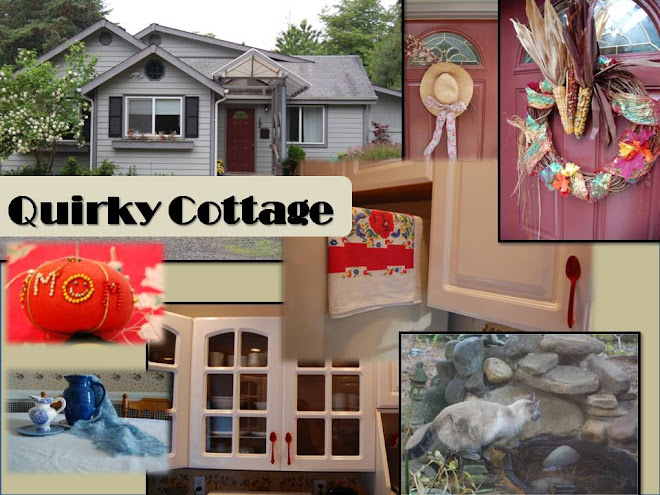It gives me great pleasure to introduce the Cottage Master's Aunt Lucille. She was born on November 30, 1925 in Loose Creek, Missouri where she lives today. She has lived through the depression of the 1930's and the war years of the early 1940's. She has graciously agreed to share some of her memories with us.
I grew up on a farm. Neighbors were few and far-between. They were older couples with grown children, so we were the only kids around. There was a family a mile from us with nine children and we'd see them several times in the Summer months. When I was twelve or thirteen, a family of sixteen children moved to the neighborhood; we were never lonely after that.
We had an old car until I was eight or nine years old. One Sunday we went to a parish picnic in a neighboring town. My Dad had to fix seven flat tires on that trip. We didn't have money to buy new ones so thereafter, we had to walk to wherever we had to go for the next four or five years.
The great depression had started in 1929 and continued through the 1930s’. There were no jobs, therefore no money. We were poor but didn't know it then, as we always had food to eat and never went hungry. My folks had several big garden plots and raised all sorts of vegetables in the Spring and Summer months. My Mom canned vegetables, fruits, berries, jellies and pickles for our food during the Winter.
We had an old car until I was eight or nine years old. One Sunday we went to a parish picnic in a neighboring town. My Dad had to fix seven flat tires on that trip. We didn't have money to buy new ones so thereafter, we had to walk to wherever we had to go for the next four or five years.
The great depression had started in 1929 and continued through the 1930s’. There were no jobs, therefore no money. We were poor but didn't know it then, as we always had food to eat and never went hungry. My folks had several big garden plots and raised all sorts of vegetables in the Spring and Summer months. My Mom canned vegetables, fruits, berries, jellies and pickles for our food during the Winter.
These Jars were stored on shelves in a dirt-floor cellar where they wouldn't freeze. This was under the smoke house, where they cured our meats.
We raised chickens for eating and for eggs; butchering hogs provided our other meats - hams, bacon, a variety of sausages, pork chops, spare ribs and lard used for baking and frying. We had cows for the milk, cheeses and butter; and their offspring were shipped out at a certain age, which was our meager income. My Dad would hunt for squirrels and rabbits for additional food.

We raised chickens for eating and for eggs; butchering hogs provided our other meats - hams, bacon, a variety of sausages, pork chops, spare ribs and lard used for baking and frying. We had cows for the milk, cheeses and butter; and their offspring were shipped out at a certain age, which was our meager income. My Dad would hunt for squirrels and rabbits for additional food.

Turkey chicks
 Hog butchering time
Hog butchering timeHe had horses to pull the plow, wagons and other farm machinery. Then there was a special wagon used for hauling hay to the barn. He raised corn plus the hay to feed the horses, hogs and chickens. Also wheat. At harvest time, a man with a huge steam engine and threshing machine would go from farm to farm to separate the grain from the straw. It was a big event. All the neighbors would help so there was a gang to feed at mealtime. It was a lot of work for the women. The straw was later used as bedding in the barn and also in the chicken house in the hens' nests. The grain was used as feed and some was taken to a mill to be ground into flour for baking purposes.
We didn’t have plumbing or electricity. Kerosene lamps were used in the evenings. People went to bed shortly after dark and were up at the crack of dawn. Kerosene lanterns were carried when we went visiting at night.
The grocery stores were nothing like our super-markets today. We raised most of our food, but we still needed to trade eggs and excess produce for sugar, coffee beans, ( which we had to grind at home ) spices, flavorings, oatmeal, salt and crackers. Some clothing and shoes were ordered from Sears and Wards catalogs. Materials and sewing supplies were available at the mercantile store. Much of the clothing was home-made.
On Sundays, people would socialize after Church services and often visit neighbors in the afternoon to play cards or just converse.

from left to right, Sis, Mom and Lucille
Wood-burning stoves kept us warm in the Winter-time. Between farming chores, my Dad would cut down timbers six to ten inches in diameter and hauled them to near our house. A neighbor had a saw rig and like the threshing crew, neighbors would come and help cut the timbers into lengths to fit the stoves. Wood for the kitchens’ cook stove had to be split into smaller pieces.
In Summer-time, my Mom had a kerosene stove for cooking our meals. The arrival of electricity in the early 1950s’ made a tremendous difference in the rural peoples’ life-style. My Moms’ first appliances were a washing machine, iron, refrigerator and a range.
Mrs.RGS

2 comments:
How fun to hear of the days that seem so long ago - but really weren't! Pete loves the old farm equipment too, thanks!
Thanks for sharing her story. I love to hear others memories and it reminds us how much easier life is for us.
Post a Comment